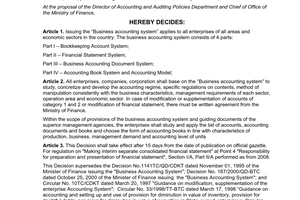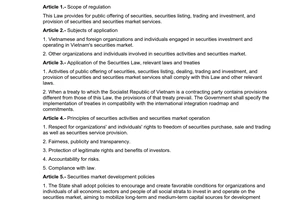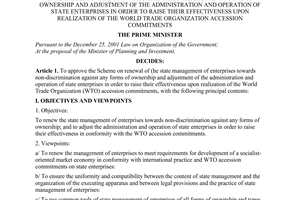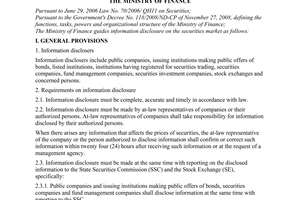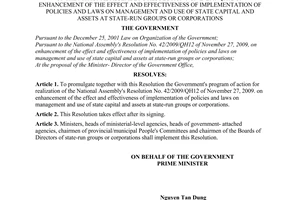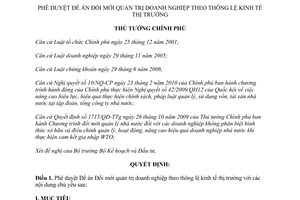Nội dung toàn văn Decision No. 704/QD-TTg approving the scheme for innovating enterprise administr
|
THE PRIME
MINISTER |
SOCIALIST
REPUBLIC OF VIETNAM |
|
No. 704/QD-TTg |
Hanoi, June 11th 2012 |
DECISION
APPROVING THE SCHEME FOR INNOVATING ENTERPRISE ADMINISTRATION ACCORDING TO MARKET ECONOMY PRACTICE
THE PRIME MINISTER
Pursuant to the Law on Government organization dated December 25th 2001;
Pursuant to the Law on Enterprises dated November 29th 2005;
Pursuant to the Law on Securities dated June 29th 2006;
Pursuant to the Government’s Resolution No. 10/NQ-CP dated February 23rd 2013, promulgating the action plan of the Government for the implementation of the National Assembly’s Resolution No. 42/2009/QH12 on the improvement of the effect of policies and laws on the management and use of State-owned property and capital in state-owned corporations;
Pursuant to the Prime Minister’s Decision No. 1715/QD-TTg dated October 26th 2009, promulgating the State management innovation program applicable to all enterprises regardless of, types of ownership, and the improvement of capability of state-owned enterprises when implementing WTO commitments;
At the request of the Minister of Planning and Investment,
DECIDES
Article 1. Approving the scheme for innovating enterprise administration according to market economy practice, in particular:
I. Target
Contribute to the completion of the market economy mechanism towards socialism; facilitate the autonomous operation of enterprises according to the market economy mechanism; promote the development and raise the efficiency as well as competitiveness of Vietnamese enterprises in the region.
II. OBJECTIVES
1. Complete the mechanism, policies, and laws on enterprise administration towards the adoption of international practice of enterprise administration in Vietnam.
2. Build up the trust of investors; enhance the protection of the interests of owners, investors, and involved parties, including state investors, small investors, and employees in enterprises.
III. PRIMARY SOLUTIONS
1. Unify the awareness of enterprise administration:
Carry out propagation and provide training in order to raise the awareness of the nature and the role of enterprise administration improvement. Emphasize the accountability, accuracy, and openness towards the assurance of the interests of involved parties, including owners, shareholders, investors, workers, clients, suppliers, creditors, the public, and the society; contribute to the completion of the market economy mechanism.
2. Keep completing the mechanism for providing information about enterprise administration:
a) Amend the regulations on submitting financial statement towards converging statement receivers. Specify the deadline and responsibility of statement receivers to promptly and accurately disclose all information sent by enterprises on their websites; the penalties for not submitting financial statements and for not disclosing information.
b) Male and provide annual reports on the investments made by state investors, including:
- The list of enterprises capitalized by the State on December 31st every year, together with the information about the type; primary lines of business; state capital; asset value; name of owners and shareholders of each state-owned enterprises.
- The reality and investment efficiency; the achievement of investment targets, including economic and socio-political targets (if any) of each groups of enterprises capitalized by the State.
- The reality of owners and shareholders of state-owned enterprises. The primary decisions made by state investors within their authority in the reported year.
c) Consider expanding the subjects of information provision standards in the Circular No. 09/2010/TT-BTC dated January 15th 2010 of the Ministry of Finance on the provision of information on the securities market for the unlisted joint-stock companies and public companies at a reasonable value.
d) Promulgate the Regulation on the provision on information about the operation of state-owned single member limited companies, especially the parent companies of economic corporations and state-owned general companies, in particular:
- Identify the purposes and requirements of the provision of information about the operation of companies in order to facilitate their autonomous operation according to the market economy mechanism, reduce the direct intervention of the State on the basis of enhancing the supervisory instruments; build up the trust of investors, partners, credit institutions, and involved parties; enable involved parties to access the information serving the process of making decisions of cooperation, investment, trade, company supervision; reduce the violation against the interests of state investors and involved parties.
- Companies shall make and announce annual and quarterly financial statements, and provide irregular information in the same manner of listed enterprises. Enterprises directly serving National defense and security shall provide information in accordance with the Prime Minister’s decisions.
- Specify the responsibility to provide information at the request of the state investors (periodically and irregularly); provide information for State management agencies as prescribed by law.
- Specify the forms of information provision.
3. Keep completing the laws on enterprise administration:
a) Study, compile, and promulgate the Regulation on joint-stock company administration based on the expansion of subjects and scope of application of the current Regulation on company administration applied to listed companies at the Stock Exchanges. Instruct joint-stock companies to formulate and implement the Regulation on enterprise administration that suit their scale and characteristics, in particular:
- Encourage enterprises to hold General meeting of shareholders; extend the deadline for sending invitations to at least 14 days before the meeting; specify the penalties for not providing information and invitation as prescribed; enable the minority of shareholders to request the convention of irregular General meeting of shareholders and nominate members of the Board of Directors; provide instruction to exercise the rights of employees to this issue via the Union at the enterprises of which a considerable numbers of shareholders are employees.
- Assert that absent votes are as valid as votes cast at the meeting. Encourage the diverse forms of absent voting.
- Expand the subjects of joint-stock companies that apply the minimum ratio of non-executive members in the Board of Directors. The Director or General Director is not necessarily a shareholder of the company.
- Add the specific regulations on handling violations.
b) Study, compile, and promulgate the Regulation on the Administration of state-owned single member limited companies, specifying that:
- The Member assembly and the President are responsible for managing, supervising, and performing the tasks assigned by the owners, completely responsible to the owner, and subject to the supervision of the owner.
- The Member assembly and the President are responsible for the selection, appointment, and dismissal of the Director or General Director in accordance with the criteria for selection, appointment and assessment of the Director or General Director.
- Separate the functions and tasks of the Company President, the President of the Member assembly and the Director or General Director; specify the cases in which the Company President and the President of the Member assembly must not hold the Director or General Director position.
- Provide the instruction to convene the Member assembly; the conditions and formality of the Member assembly meeting; and the issues related to the promulgation of Resolutions and decisions of the Member assembly.
- Provide instruction on the Company President or the Member assembly exercising the owner’s rights on behalf of the owner as prescribed in the Law on Enterprises.
- The Member assembly and the Company President are responsible for establishing and applying the system of management efficiency assessment applicable to the senior managers of the enterprise and the authorized representatives of other enterprises.
- Enable the independent controllers to act as a supervisor of the owner at the company.
- Provide instruction to pay salary, bonus, and other benefits depending on the performance of efficiency of the company, with account taken of the characteristics of the lines of business. The company is may and shall decide its own pay scale for employees and managers based on the salary bracket of the State, and on the principle that the growth of wage is slowlier than the growth of productivity. Regularly and widely organize the examination for all managerial positions and other positions.
- Specify the authority to deicide the investments of the Member assembly of the parent company in state-owned general companies and corporations in accordance with law and the Charter of each parent company in state-owned general companies and corporations.
c) Promulgate Decrees on the establishment, organization, operation, management, and supervision of state-owned general companies and corporations while all state-owned enterprises are converted into joint-stock companies and limited liability companies that run in accordance with the Law on Enterprises, in particular:
- The state owners shall manage and supervise the organization, establishment, participation, restructuring, dissolution, ownership conversion; charter implementation, personnel management; target achievement, orientation, objectives, strategies, plans; the preservation and development of state capital, the result and effect of business, investment, and finance.
- Identify the supervisors and specify their entitlements and responsibilities. Appoint an agency to coordinate the supervision, analysis, assess the supervision result, and suggest solution in the short run.
- Identify bases for supervision and assessment, including: supervision criteria system, annual and long-term assessment; assessment system for representatives of state owners at enterprises; responsibilities of supervised objects, special assessment, and the responsibility to provide information, reporting regime, and handling measures after the supervision and assessment results are given.
- Emphasize responsibilities of authorized representatives of state owners. Create a legal basis between the state owner and authorized representatives by contracts that bind the interests and legal liability; identify the rights and obligations of the owner, the rights and obligations must be approved by the owner before voting or making decision at the company, as well as the mechanism for mitigating damage caused by inconformity with the agreement of authorized representatives
- Apart from the enterprise charter, the owner shall issue or request the Member assembly or the Board of Directors or General Director to issue the internal administration regulation of the enterprise, composed of at least the regulations on investment and procurement; the regulations on budget estimate and spend management; the regulations on employment, salary, bonus, training, and dismissal; the regulations on the operation of the Board of Directors; the regulations on the operation of controllers and the Control Board; the regulations on internal inspection and supervision (supervising the production, business, finance, and risks). Each enterprise, corporation and general company has a separate charter that suit their conditions and requirements.
d) Amend and guide the implementation of the regulations on business amalgamation, merger, selling assets, including selling and transferring projects of investment, encourage and enable enterprises to concentrate their capital and expand their scale.
4. Keep completing the mechanism for supporting the improvement of enterprise administration:
a) Create a fair business environment among enterprises according to the programs of restructuring investments, restructuring state-owned enterprise, and restructuring credit institutions among the solutions of the Government for restructuring the economy together with converting the growth model towards increasing the efficiency, productivity, and competitiveness of the economy.
b) Innovating the State management and support the improvement of enterprise administration:
- Study and suggest solutions for implement Clause 1 Article 62 of the Law on Enterprises: “The Government shall unify the state management of enterprises; appoint an agency responsible to the Government for cooperating with other Ministries and agencies in state management of enterprises; Enhance mobilizing human resources and other resources so that business registration agencies are able to fulfilled the delegated duties.
- Detach the state management of enterprises from the provision of public services in central and local State management agencies. Start separating the personnel in charge of providing public services for enterprises in order to establish autonomous units. Keep enhancing the private sector involvement, delegate responsibilities to provide some services within the state management function, support social organizations in providing professional training for enterprise managers, issuing licenses or certificates of eligibility.
- Keep improving the capability of state managers in enterprises, first of all the proficiency, professionalism, ethics, and awareness of economic innovation and enterprise development.
- Facilitate the establishment and operation of the organizations that protect the investors’ interests. Provide instructions to invite representatives of associations of enterprises and associations of Vietnamese financial investors to compile Decrees or laws related to enterprise administration.
c) Raise the professionalism of investors and owners, especially state investors. Separate the functions of state investors from the state administrative management function of State agencies. Keep innovating the method of exercising the rights of state investors according to market economy practice, in conformity with the socio-economic development in Vietnam on the basis of identifying agencies in charge of exercising the state investors’ rights and not performing the state administrative management function.
- Complete and implement the plan for restructuring state-owned enterprises as soon as possible; convert all commercial state-owned enterprises into joint-stock companies.
IV. IMPLEMENTATION ORGANIZATION
1. The Enterprise Development and Innovation Council shall assist the Prime Minister in directing the project of restructuring state-owned enterprises, especially state-owned general companies and corporations after the Prime Minister grant the approval.
2. The Ministry of Finance shall:
- Disclose general information about the investments made by state investors and the operation of state-owned enterprises every year on the website of the Ministry of Finance; make and submit annual reports on the efficiency of state capital, the preservation and development of state capital and state-owned assets in enterprises to the Government and the National Assembly from 2013.
- Amend the Enterprise accounting regulation in the Decision No. 15/2006/QD-BTC dated March 20th 2005 on financial statements in order to converge the Financial statement receivers and specify their responsibilities for providing information about enterprises in Q2 2013.
- Promulgate Circulars to instruct joint-stock companies to provide information on the basis of expanding the subjects of application of the Circular No. 09/2010/TT-BTC dated January 15th 2013 on information provision on the securities market in Q3 2013.
- Promulgate the Regulation on joint-stock company on the basis of expanding the subjects and scope of application of the Regulation on company administration applicable to the companies listed at the Stock Exchanges in Q 1 2013.- Promulgates Circulars on guiding the mechanism for covering the expense of the enterprises participating in the macroeconomic regulation, price and market stabilization, and socio-political objectives in Q2 2013.
- Regularly intensify the state management and inspection of the quality of accounting of state-owned general companies and corporations; request all state-owned general companies and corporations to make and disclose their consolidated financial statements in accordance with the accounting standards.
3. The Ministry of Planning and Investment shall:
- Formulate the plans for exercising the rights and fulfilling the obligations of state owners to state-owned enterprises, and compile the Decrees on the management and supervision of state-owned general companies and corporations of crucial importance according to the Work Program 2012 of the Government.
- Request the Prime Minister to issue the Regulation on the provision of information about the operation of state-owned single member limited companies in Q3 2013.
- Request the Prime Minister to issue the Regulation on the administration of state-owned single member limited companies in Q4 2013.
- Cooperate with relevant agencies in studying, reviewing, summarizing, and suggesting the amendments of the Law on Enterprises, including the enterprise administration issues.
- Regularly complement and upgrade the national enterprise information system; keep raising the quality and simplifying enterprise registration formalities.
4. Other Ministries, People’s Committees of central-affiliated cities and provinces, and the organizations appointed to represent state investors shall:
- Intensify the propagation, provide training for State management agencies, enterprises, investors, employees, and the relevant subjects in order to raise the awareness of the role of enterprise administration improvement.
- Restrict the separation between the types of ownership while compiling, promulgating, and implementing the policies on the development of industrialization and modernization, the strategies for sectoral and territorial development within the state management function of Ministries. The activities within the state management function such as promulgating legislative documents, formulating strategies for sectoral and territorial development are done by the Ministries and agencies belonging to the central and local state management apparatus on the basis of creating equitable opportunities and conditions for all enterprises from any economic sectors to participate; invite representatives from associations of enterprises to compile the documents related to enterprise administration.
- Keep opening the market of monopolistic industries. Strictly comply with the regulations on monopoly management and control, and competition stimulation. Keep simplifying administrative formalities, especially in customs, land, investments, and taxation areas.
- Detach the state management of enterprises from the provision of public services in central and local State management agencies. Separate the personnel in charge of providing public services for enterprises in order to establish autonomous units.
- The agencies representing state investors shall review and assess the development to set long-term, mid-term, short-term, and annual targets of each state-owned enterprise. Apart from current financial targets (ratio of profit, revenue, production, etc.) it is required to set targets for state-owned enterprises, state-owned general companies and corporations such as export revenues, on a case-by-case basis; the extent of technological development, the capability of research and technological innovation; the position or market share in Vietnam and in the world are the basis for supervising and assessing the operation of state-owned enterprise.
Article 2. This Decision takes effect on the day on which it is signed.
Article 3. The Ministers, Heads of ministerial-level agencies, Heads of Governmental agencies, the Presidents of People’s Committees of central-affiliated cities and provinces, the Presidents of the Member assemblies, the Presidents of the Boards of Directors, General Directors of state-owned corporations and state-owned general companies are responsible for the implementation of this Decision./.
|
|
PP THE PRIME
MINISTER |
------------------------------------------------------------------------------------------------------
This translation is translated by LawSoft,
for reference only. LawSoft
is protected by copyright under clause 2, article 14 of the Law on Intellectual Property. LawSoft
always welcome your comments


